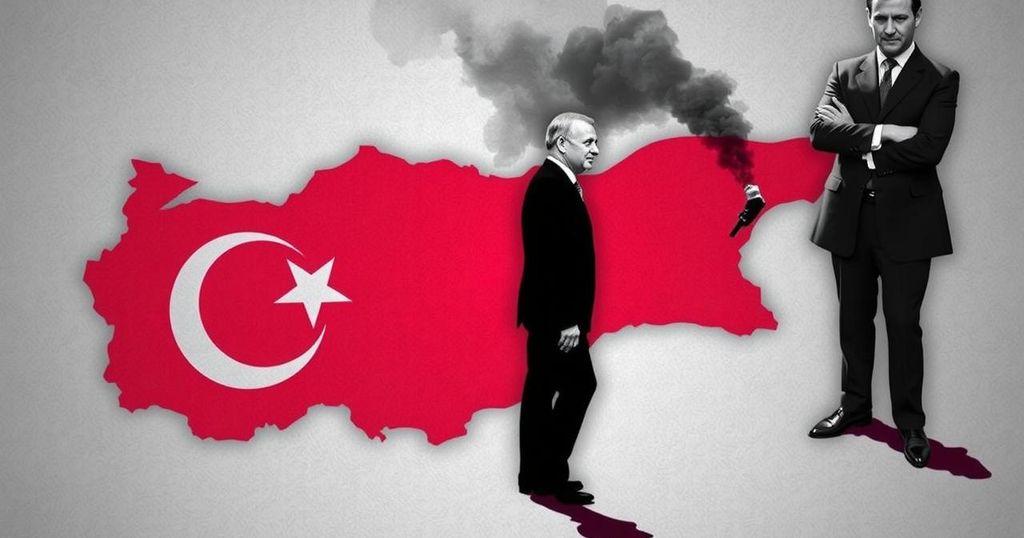Turkey’s Strategic Realignment in Syria: Challenges and Opportunities

Turkey is reassessing its Syria strategy amid military deadlocks and international pressures. The country’s focus is shifting towards political solutions, potentially affecting its policies regarding the Kurdish PKK. Despite attempts for dialogue with Assad, obstacles remain. Simultaneously, the implications of a U.S.-Turkish cooperation in steering clear of conflict pose additional challenges and opportunities. A proposed parliamentary address by Ocalan could signify a significant pivot in addressing the Kurdish issue.
Turkey is at a pivotal point in its strategy regarding Syria, faced with military stalemate, Russian opposition, and economic pressures from the United States. To move forward, Ankara is exploring political alternatives that may involve a significant adjustment to its Kurdish policy. This entails considerations such as engaging with the Syrian government’s leadership to counter the dominance of the Kurdish YPG forces within the U.S.-backed Syrian Democratic Forces (SDF).
Ankara’s actions aim to address its security concerns stemming from the PKK, particularly as the group’s stronghold has shifted from Iraq to Syria. Despite military operations intended to establish a secure zone free from YPG influence, Turkey has encountered substantial resistance from both Russia and the U.S. Russia has effectively deterred Turkish military actions by reinforcing its military presence in the region, while the U.S. continues to oppose Turkish advances due to its alliance with the SDF in counterterrorism operations against ISIS. Economic sanctions have been threatened by the U.S. as a means to stall Turkish maneuvers, adding to Ankara’s complexities as it grapples with domestic economic issues.
Further attempts at dialogue with Syrian President Bashar al-Assad aimed at improving relations and security collaboration have faltered, underscoring the challenges Turkey faces. Despite President Erdoğan expressing a willingness to engage with Assad, significant obstacles remain due to differing priorities and objectives. Additionally, Turkey’s fear of a U.S.-supported Kurdish state on its borders remains a central concern, heightening tensions as the possibility of broader regional conflicts looms.
In a recent development, Devlet Bahceli, the leader of a supporting political party, indicated the potential for Abdullah Öcalan, the imprisoned PKK leader, to address the Turkish Parliament, suggesting a pivot towards resolving the Kurdish issue politically rather than militarily. This proposal raises questions about its feasibility and Erdoğan’s subsequent responses indicate a cautious approach. The implications of this initiative on both Turkish domestic politics and its strategy in Syria are uncertain.
The cooperation between Turkey and the U.S. presents an opportunity to recalibrate their shared interests in the region, as both nations seek an exit strategy from the Syrian quagmire. However, it is crucial for the United States to remain impartial and not be perceived as directly involved in Turkey’s dealings with the PKK, as this could jeopardize diplomatic relations. The complex interplay of regional dynamics and internal politics will shape Turkey’s future engagements in Syria.
Turkey’s involvement in Syria has been driven primarily by its desire to eliminate threats from the Kurdistan Workers’ Party (PKK) and its affiliated groups, particularly the YPG within the SDF, which the U.S. supports. Since initiating military operations in Syria, Turkey has encountered obstruction from both Russia and the United States. The dynamics have changed significantly since U.S. withdrawal announcements in 2019, leading to heightened Russian activity in the region to protect the SDF. Furthermore, Turkey’s military strategy has not yielded the desired results, forcing Ankara to reconsider its approach amidst rising domestic pressures and geopolitical challenges. Turkey’s repeated attempts to dialogue with Syrian authorities have revealed significant hurdles, particularly given Assad’s own objectives that diverge from Turkey’s, thereby complicating any potential alliance.
In conclusion, Turkey is at a crossroads concerning its strategy in Syria, necessitating a shift from military confrontations to potentially more diplomatic routes to resolve its Kurdish issue. The intertwining of domestic pressures and international relations greatly influences this strategy shift, as both the U.S. and Russia play pivotal roles in shaping Turkey’s operational freedom. While there are signs of a potential new dialogue approach regarding the PKK, significant challenges persist. Turkey’s future actions will be crucial in understanding its position within the broader regional context, particularly regarding relationships with Syria, the U.S., and Russia.
Original Source: www.atlanticcouncil.org








